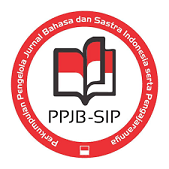EFEKTIVITAS PENGGUNAAN METODE BUZZ GROUP DALAM PEMBELAJARAN MENULIS RESENSI CERITA PENDEK DI KELAS XI SMK NEGERI 3 SINGARAJA
DOI:
https://doi.org/10.23887/jjpbs.v7i2.15129Abstract
Penelitian ini bertujuan untuk (1) mendeskripsikan prestasi siswa dalam pembelajaran menulis resensi cerita pendek dengan menggunakan metode buzz group, (2) mendeskripsikan respons siswa terhadap penggunaan metode buzz group dalam pembelajaran menulis resensi cerita pendek, dan (3) mendeskripsikan kendala-kendala yang dihadapi oleh guru saat menggunakan metode buzz group dalam pembelajaran menulis resensi cerita pendek. Penelitian ini menggunakan rancangan penelitian deskriptif kualitatif dan deskiptif kuantitatif. Subjek penelitian ini adalah guru dan siswa kelas XI SMK Negeri 3 Singaraja. Objek penelitian ini yaitu penggunaan metode buzz group dalam pembelajaran menulis resensi cerita pendek. Metode pengumpulan data yang digunakan adalah metode observasi, tes, angket/kuesioner, dan wawancara. Data yang diperoleh dianalisis dengan teknik analisis deskriptif kualitatif dan deskriptif kuantitatif. Hasil penelitian ini menunjukkan bahwa (1) siswa memperoleh prestasi yang baik dengan digunakannya metode buzz group. Dari 121 orang siswa, sebanyak 91 orang siswa (75.22%) mendapatkan nilai dengan kategori baik, (2) hasil kuesioner menunjukkan, dari 121 orang siswa, sebanyak 80 orang siswa (66.13%) memberikan respons positif terhadap penggunaan metode buzz group dalam pembelajaran menulis resensi cerita pendek, dan (3) kendala-kendala yang dihadapi oleh guru saat menggunakan metode buzz group yaitu dari segi waktu dan lingkungan belajar siswa. Penggunaan metode buzz group ini efektif digunakan dalam pembelajaran menulis resensi cerita pendek.Kata Kunci : pembelajaran, cerita pendek, metode buzz group, menulis, resensi
This study aimed to (1) describe the students' achievement in short story review writing by using the buzz group method, (2) to describe the student's response to the use of buzz group method in short story review writing, and (3) to describe the struggles faced by teachers when using the buzz group method in short story review writing lessons. This research uses descriptive qualitative and descriptive quantitative research design. The subjects of this study were teachers and students of grade XI SMK Negeri 3 Singaraja. The object of this research was the use of buzz group method in learning writing short story reviews. Methods of data collection used were the method of observation, test, questionnaire, and interview. The data obtained was analyzed by qualitative descriptive and descriptive quantitative analysis. The results of this study indicated that (1) students got good achievement with the use of buzz group method. From 121 students, 91 students (75.22%) got good grades, (2) result of questionnaire showed that from 121 students, 80 students (66.13%) responded positively to the use of buzz group method in learning writing short story reviews, and (3) struggles faced by teachers when using the buzz group method were in terms of time and student learning environment. The use of the buzz group method was effectively used in short story review writing lessons.
keyword : learning, short stories, buzz group methods, writing, reviews
Published
2018-07-26
Issue
Section
Articles
License
Authors who publish with the Jurnal Pendidikan Bahasa dan Sastra Indonesia Undiksha agree to the following terms:- Authors retain copyright and grant the journal the right of first publication with the work simultaneously licensed under a Creative Commons Attribution License (CC BY-SA 4.0) that allows others to share the work with an acknowledgment of the work's authorship and initial publication in this journal
- Authors are able to enter into separate, additional contractual arrangements for the non-exclusive distribution of the journal's published version of the work (e.g., post it to an institutional repository or publish it in a book), with an acknowledgment of its initial publication in this journal.
- Authors are permitted and encouraged to post their work online (e.g., in institutional repositories or on their website) prior to and during the submission process, as it can lead to productive exchanges, as well as earlier and greater citation of published work. (See The Effect of Open Access)







